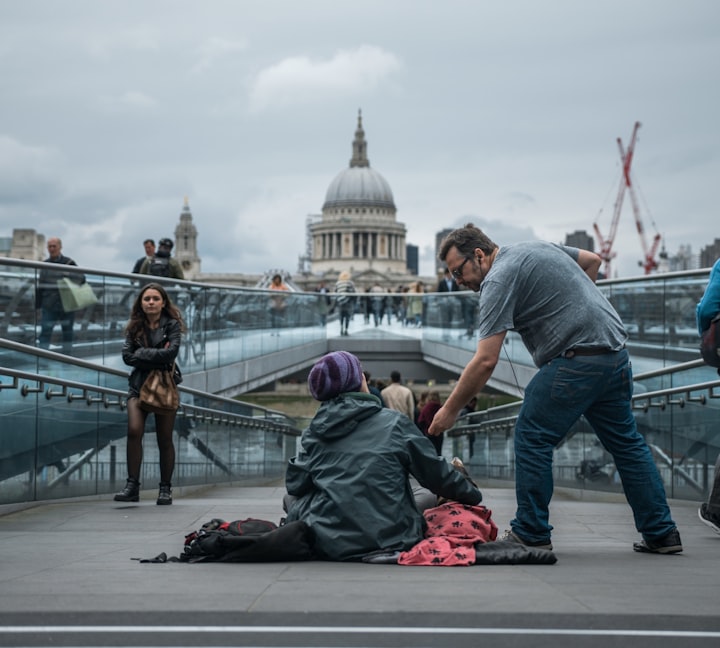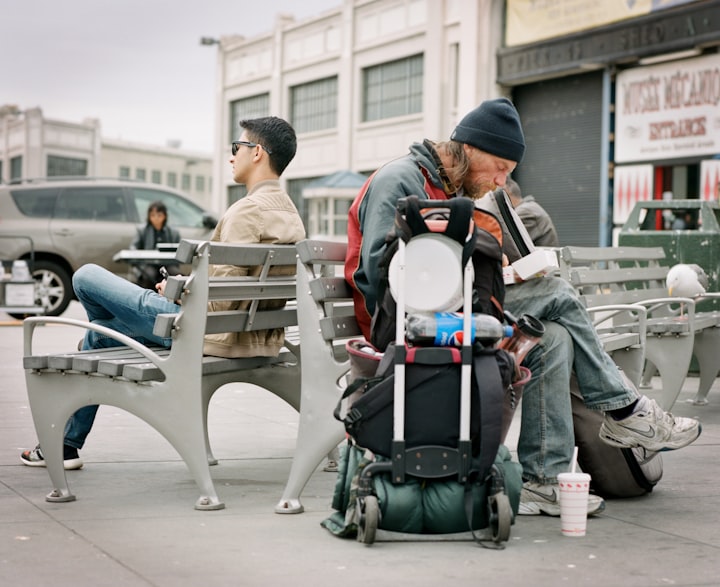Why mentally ill homeless people don't seek treatment
Finding help is not as easy as you may think

Editor's note: An earlier version of this article appeared on News Break.
I hear it all the time. Why don’t mentally ill homeless people seek treatment?
It’s as though people think they can just snap their fingers and receive help.
It’s not that easy for most homeless people. It took me two years before I found a doctor I respect.
My struggle with mental illness and mental hospitals began shortly after I moved to Denver. A neighbor had called me a derogatory term and I called police.
The Glendale, Colo. police showed up and decided to take me to a mental hospital. The police brought someone with them who claimed to be a mental health professional. He apparently declared me a danger to myself.
I was not even remotely suicidal.
Judge releases me from mental hospital
The Glendale police told me a former publisher of mine had called them. She reportedly became concerned with some of my Facebook posts.
In the mental hospital in Louisville, Colo., I sustained several bruises from beatings when I would become upset. I also suffered a hernia during exercise class that still has not been repaired.
I was released from the mental hospital by a judge, which I am told only happens in 1 percent of cases. There was no plan of care upon my release.
I returned to my Glendale apartment and immediately fled it. I could no longer trust the police in a town where I did not feel safe.
I stayed in luxury hotels a while until I became homeless. It took about a month before I had another run-in with police.
Denver Health discharges me to the street
I had become involved in a fight on 16th Street Mall. The police responded and took me to a second mental hospital, Denver Health.
I stayed in Denver Health a month and was released with no housing plan. In other words, I was released back to the street.
I was not allowed to stay in shelters. When I reported abuse, I was thrown out of both Salvation Army Crossroads and 48th Street.
I slept on a sidewalk or in the woods.
It took only a week after my discharge before I was beaten on Free Mall Ride. I ended up at Denver Health for stitches. I pleaded with them to put me back into mental health. They would not.
Mental Health Center Denver no help
During several nights of angst on the street I walked to Mental Health Center Denver. They have a crisis center, but it is an exceptionally long walk up Colfax from downtown, and through some dangerous areas. It is open all the time.
The problem is, they don’t help you. Or at least they never used to. They give you a Hot Pocket to eat and an appointment to return.
Back to the street you go.
I did go the Mental Health Center Denver main office on Downing once for an intake, but the process creeped me out. I didn’t like the questions they asked.
I wrote about my experience with Mental Health Center Denver on a homeless blog I used to operate. They didn’t like the piece. They said they would deny me future treatment unless I took the blog down.
I refused. Since then, I have taken down the entire website.
I then ended up in a third mental hospital after yet another run-in with police. This time they put me in Aurora Mental Health. Aurora Mental Health only kept me two days.
State mental hospital gives me care I needed
Finally, I ended up in the state mental hospital, where I spent about six months. It was a good place. And the state mental hospital makes sure you have housing before they let you go.
You can read my News Break story about the state mental hospital by clicking here.
Today, I have housing and the best healthcare of my life provided by Colorado Coalition for the Homeless. Although the Coalition is a Godsend, it can take several years to obtain housing.
I can tell you that homelessness is as unstable a situation a person can find themselves in. It is almost impossible for people without a history of mental illness to remain mentally healthy when experiencing homelessness. Those with a history of mental illness have an even more difficult time.
Without housing, mental health poor
Now that I have a bed at night and a roof over my head, and the proper medication, I don’t spend every hour of every day concerned for my safety. I used to spend every moment in a heightened state of alert.
I frequently would become angry when other homeless people, police or health care workers would discredit my story of how I became homeless.The story is less important than the fact people were denying my trauma.
And that just made me angrier.
That’s my story with Denver’s mental health care system.
Common reasons appointments are not kept
There are several reasons why homeless people don’t seek mental health care, including:
A distrust of authority. To homeless people, doctors aren’t much more trustworthy than cops. They can brand you with a stigmatizing diagnosis. They all push pills that cause you to slow down and gain weight. And they talk to cops a lot.
They might have a warrant. Some homeless people are running from the law. They don’t want to be put into a situation where they must give their name to a healthcare provider.
An outreach worker makes an appointment, but the homeless person doesn’t keep it. The homeless person may be too tired to walk to the office and unable to obtain a bus pass. Being homeless means you have no money at all unless you panhandle or receive disability. Riding the bus is expensive in cities like Denver.
Many if not most homeless people don’t have a phone. There is no way to reschedule an appointment or call in sick or late.
Stigma and pride keep them from seeking help. Until they reach a point of hopelessness and fear, some people refuse to seek mental health treatment.
Is it any wonder? The latest slams in politics always center around a politician’s mental health. “Is so and so mentally fit to hold office?” People pretend to act concerned when in fact they are discrediting a political opponent.
It’s absolutely disgusting. The news media should be ashamed of themselves for writing stories that question the mental health of others when they clearly are politically motivated.
We all could stand to be a little kindler and gentler regarding how we talk about mental illness. Only then will those struggling with mental illness feel comfortable enough to seek help, homeless or not.
About the Creator
David Heitz
I am a journalist with more than 30 years' experience. Here at Vocal, I write mainly for Potent, Vocal's cannabis magazine. I have a PTSD diagnosis and a medical cannabis card. I have lived in a penthouse and also experienced homelessness.






Comments
There are no comments for this story
Be the first to respond and start the conversation.